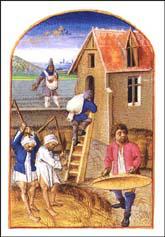Matthew Paris
Matthew Paris was born in about 1200. As a young man he entered the monastery at St. Albans. Matthew was interested in history so he was given the job of helping Roger of Wendover, the chronicler of the abbey of St. Albans. In 1236 Matthew took over from Roger.
St Albans abbey is situated on the main road north from London. Many travellers stopped for the night at St Albans and Matthew Paris was able to collect a lot of information from them about what was going on in the rest of the country.
Matthew's reputation as a historian grew and important people visited him, no doubt hoping that he would say nice things about them in his books. Those who visited him included Henry III. However, Matthew disagreed with Henry's policy of appointing foreign advisers and he was often very critical of the king.
As well as being a good writer, Matthew was a talented artist, and in the margins of his books he illustrated the text with drawings and paintings. Although he has been criticised for relying too much on rumour and gossip and being prejudiced against foreigners and friars, Matthew Paris is considered to be one of the most important historians of the medieval period. Matthew Paris died in 1259.

Primary Sources
(1) Matthew Paris, English History (c. 1250)
If you speak or write truth about powerful men, they become your enemies.
(2) Thomas Walsingham, Deeds of the Abbots (c. 1420)
He (Matthew Paris)... wrote down fully in his books, the deeds of great men in Church and State... Moreover he was also a good workmen in gold and silver... in carving and in painting, that he is believed to have left no equal in this world.
